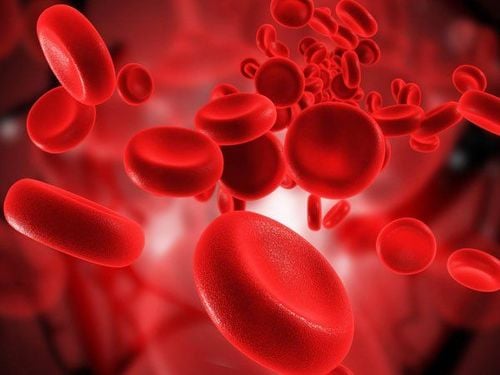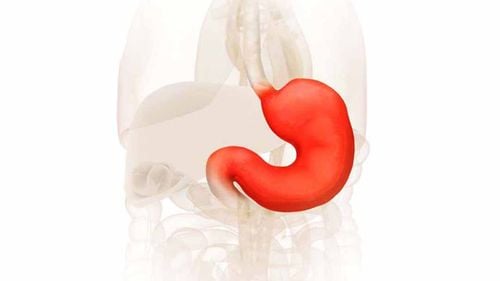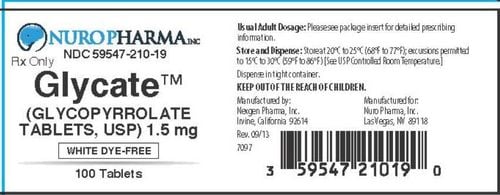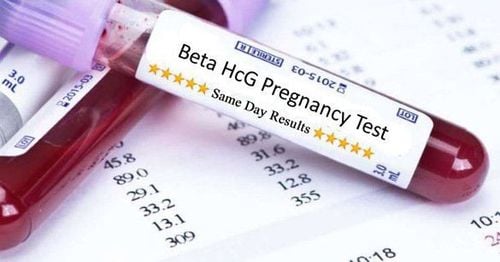This is an automatically translated article.
The article was professionally consulted by MSc Do Thi Hoang Ha - Doctor of Biochemistry, Laboratory Department - Vinmec Hai Phong International General Hospital.Gastrin is an important hormone in the release of hydrochloric acid into the stomach and regulates the body's digestion of food. The blood test to evaluate the hormone Gastrin is of great value for diagnosing gastrointestinal diseases and monitoring treatment.
1. What is the hormone Gastrin?
Gastrin is a polypeptide hormone produced and stored in G cells (G-cells) of the antrum, gastric pylorus, and pancreatic islet cells of Langerhans. Gastrin is primarily responsible for promoting gastric mucosal growth, gastric motility, and is a hormone that the stomach produces to stimulate parietal cells to produce and release and excrete hydrochloric acid (HCl). into the stomach. Normally, the stomach produces 2 to 3 liters of acidic fluid per day. The low pH of gastric juice helps the body digest and absorb the nutrients in food, especially proteins and amino acids, allowing the stomach to break down proteins from food, helping to convert inactive pepsinogen into pepsin is active, digesting proteins in the stomach, as well as releasing cobalamin (vitamin B12) from the salivary protein carrier R, absorption of some vitamins. Gastrin also acts as an antiseptic and kills most bacteria that enter the stomach with food, minimizing the risk of infection in the intestinesAnother effect of Gastrin is to stimulate the gallbladder to empty the bile stores. and pancreas to secrete enzymes. Bile and pancreatic enzymes help absorb food in the small intestine.
Gastrin is secreted by G cells when there are the following responses:
When there are protein, calcium or alcohol molecules in contact with the stomach lining The act of swallowing, smelling or tasting food stimulates nerves vagus nerve. When the antrum is stretched due to containing food inside The pH level in the stomach decreases, the secretion of gastric acid works by negative feedback mechanism, when the pH level is too high (alkaline) it will stimulate the secretion of Gastrin to help. Increase gastric acid secretion and vice versa, when the pH is too low, it will inhibit the secretion of Gastrin and reduce acid secretion. In addition, Gastrin is also released due to the stimulation of pancreatic enzymes, pepsin of gastric juice and some elements of the liver (such as bile) to increase gastrointestinal motility during the digestion of food. Gastrin is released primarily in response to vaginal GRP peptide stimulation, and gastrin release is secondary to peptide ingestion, amino acids, gastric upset, and gastric pH elevation. In contrast, this release was inhibited by somatostatin and decreased gastric pH by a negative feedback mechanism.
2. What is the blood gastrin level test?

Results of quantification of Gastrin levels help doctors get useful information to diagnose diseases that cause abnormal gastrin secretion such as Gastrin-secreting cell tumors (Gastrinoma), Gastrin-secreting tumors in Zollinger-Ellison syndrome , peptic ulcer, pernicious anemia Bierrmer.
In addition, the doctor can also use the gastrin stimulation test (provocative test) to evaluate the function of gastrin secretion of the stomach, helping to distinguish peptic ulcer disease from Zollinger-Ellison syndrome. Your doctor may also order a gastrin test if you have had gastrin-producing tumors removed, a test that helps monitor tumor recurrence.
The main indication of Gastrin test is to quantify Gastrin levels to help diagnose various gastric diseases and clarify Gastrin secretion from tumors (Zollinger-Ellison syndrome)
3. How to do the Gastrin Blood Test
Before taking the Gastrin blood test, you need to fast for the previous 12 hours. You can drink water, but do not eat any food during this time. You should also avoid drinking alcohol for at least 24 hours before the test. Be sure to tell your doctor about any medications or supplements you take, including vitamins and herbs, as well as prescription and over-the-counter medicines, especially those that reduce stomach acid secretion. or drugs that lower stomach pH. Or you are having some problems as well as having a medical history such as:
Gastrin test after secretin injection (gastrin test after secretin) injection of 2 -3 u/kg secretin within 30 seconds is the most commonly used stimulation test for patients with suspected Zollinger-Ellison syndrome. Quantification of baseline serum gastrin levels and after secretin stimulation is the best laboratory test for gastrin-secreting cell tumors (gastrinomas). Gastric stimulation test after intravenous calcium infusion (15 mg Ca/kg in 500 mL of normal saline over 4 hours) is useful in patients with markedly elevated plasma levels. blood gastrin. This test is indicated for patients with negative secretin stimulation test, increased gastric acid secretion and clinically suspected Zollinger-Ellison syndrome.
4. Factors affecting changes in blood Gastrin test results

Falsely elevated gastrin results can occur when the blood is high in lipids or the patient eats foods high in protein. Accordingly, drugs that can increase blood gastrin levels are: Acetylcholine, gastric acid-neutralizing drugs, beta-blockers, calcium carbonate, calcium chloride, cholinergics, cimetidine, famotidine, ranitidine, insulin , nizatidine, proton pump inhibitor.
Drugs that can reduce blood gastrin levels are: sympathomimetics (adrenergic blockers), anticholinergics (anticholinergics), caffeine, calcium salts, corticosteroids, ethanol, Rauwolfia serpentina, reserpine, tricyclic antidepressants.
5. Assessment of gastrin hormone test results
There are many factors that can affect your test results. The results obtained may also vary depending on the test kit and reference range used by the laboratory. In general, the normal range for gastrin levels is:0-180 pg/mL (picogram per milliliter of blood) for adults (this ratio may be higher in physiologically older adults) 0-125 pg/ mL for children Gastrin levels that are too high can be caused by a condition called Zollinger-Ellison syndrome (ZE). This may be due to a gastrin-secreting tumor in the digestive system that secretes excessive gastrin. These tumors are called gastric tumors. They are usually located in the first part of the small intestine (duodenum) or in the pancreas. The increased amount of Gastrin can cause more acidity in the digestive system. This can trigger symptoms of diarrhea and can lead to ulcers in the stomach and small intestines as well as nausea, persistent abdominal pain, burning, throbbing, dull pain, and discomfort in the stomach. upper abdomen.
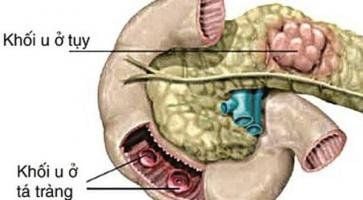
When your doctor suspects you have a gastrin-secreting cell tumor (gastrinoma) is when the clinical picture is a strong increase in gastric acid secretion combined with very high blood gastrin levels up to 500-1000 pg/ mL. Moderately elevated gastrin levels should be ruled out for G-cell hypersensitization and G-cell hyperplasia by performing a gastrin-stimulation test.
If you have a gastric tumor that was removed through surgery and the test results show an increase in gastrin, it means that there has been a tumor recurrence. If the gastrin level does not go down after surgery, it means the procedure was not successful.
Some common causes of increased blood gastrin levels are often:
Elderly people: are considered to have "physiological" increases with age because up to 15% of normal people > 60 years old have blood gastrin levels of 100 -800 pg/mL. The stomach does not have hydrochloric acid in the gastric juice (achlorhydria). Reduced gastric hydrochloric acid (hypochlorhydria). This condition is seen in pathologies such as atrophic gastritis, Biermer's pernicious anemia, and post-vagal neurectomy. Peptic ulcer disease G-cell hyperplasia of the antrum. End stage kidney disease Hyperparathyroidism causes hypercalcemia. Stomach cancer pyloric stenosis Hyperuremic syndrome Use of drugs that inhibit gastric acid such as gastric acid neutralizers, H2 antagonists (eg ranitidine, famotidine) or proton pump inhibitors (eg esomeprazole , omeprazole). Zollinger-Ellison syndrome. It is very rare for the test results to show too low a gastrin level. But if this happens, there is a high chance that your stomach may not be absorbing nutrients properly. You may also be at increased risk of infections from the digestive system due to low stomach acid levels. Gastrin levels in the normal or low range are usually not conditions of concern.
Currently, Vinmec International General Hospital has deployed a blood test to check the concentration of the hormone Gastrin. The testing process at Vinmec is carried out methodically and in accordance with the standards by a team of highly qualified medical professionals, modern machinery system, thus giving accurate results, making a significant contribution to the identification. disease and disease stage.
Please dial HOTLINE for more information or register for an appointment HERE. Download MyVinmec app to make appointments faster and to manage your bookings easily.
Reference source: webmd.com






